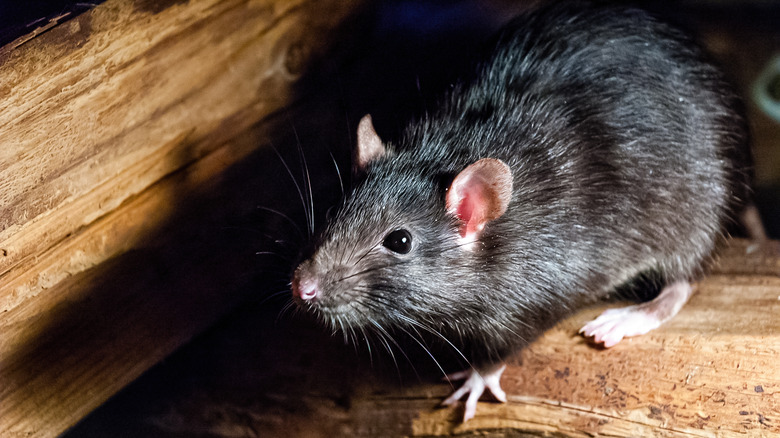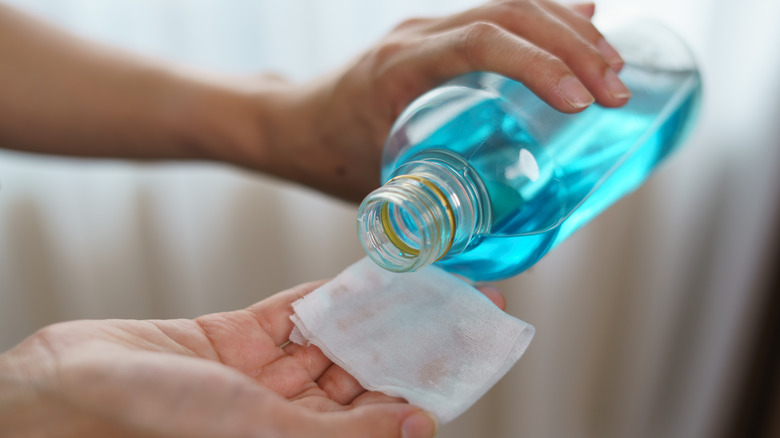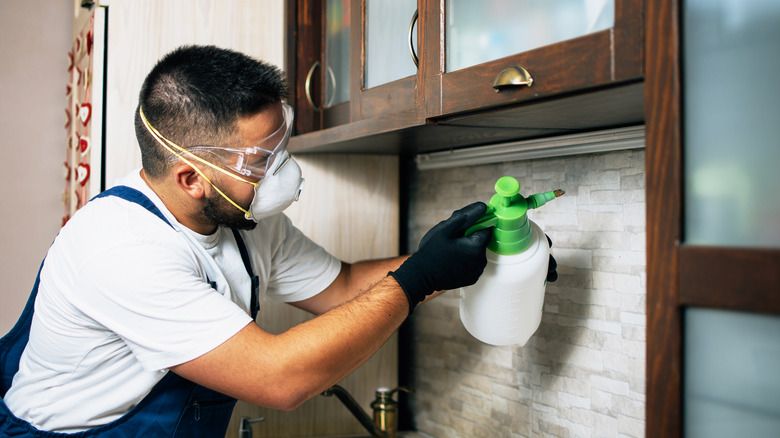Is Rubbing Alcohol The Secret To Getting Rid Of Pesky Mice?
When battling a mouse problem in your home, rubbing alcohol might seem like a good solution. After all, it's good at cleaning surfaces and boasts a strong smell, plus rubbing alcohol makes a good deterrent for small insects like mites and fungus gnats. But let's set the record straight: There's no solid scientific evidence that it can deter mice. The idea is mostly anecdotal, with some pest control companies suggesting its use, often in combination with essential oils like clove, peppermint, and eucalyptus.
The truth is that dealing with mice means getting into their little rodent heads a bit. You need to understand their hiding spots and behavioral patterns. These critters have some pretty consistent habits and preferences that can help you in your efforts to keep them away. First off, they're prolific breeders. A female mouse can breed up to 10 times a year, giving birth to up to 14 pups at a time. With such breeding habits, they can take over your home in no time, breeding throughout the year. So by the time you've spotted one, it's safe to assume there are more.
Their choice of hideouts is another thing to consider. Mice are fans of cozy, quiet spots for their nests — think behind your fridge or inside hollow spots in your walls. They're not big on travel, either. Mice prefer to set up shop close to their food sources, which means if you've got a mouse, your kitchen or pantry might be their favorite haunt. With all this information to consider, rubbing alcohol alone won't be effective enough to completely get rid of mice. However, there's no harm in exploring its use, especially when combined with other ingredients.
Understanding the effectiveness of rubbing alcohol
It's not a stretch to say that additional ingredients like clove or eucalyptus essential oils may be what give the rubbing alcohol formulation (found on some pest control websites) its true effectiveness. Interestingly, a 2021 study in the Egyptian Academic Journal of Biological Sciences sheds some light on this, showing that fermented clover plant juice had a significant effect in repelling black rats with a success rate of 92.6%, demonstrating that some strong-smelling natural solutions can deter rodents. In contrast, clover plant juice's non-fermented counterpart was much less effective. Separate research in The Scientific World Journal and the Bulletin of the National Research Centre demonstrates that essential oils from eucalyptus, black pepper, bergamot, fennel, and garlic plants are effective rodent repellents. However, when it comes to clove essential oils' effectiveness in keeping rodents away, research is still limited.
While it might not be a miracle solution, when combined with certain herbal extracts, rubbing alcohol could play a supporting role in your rodent-repellent formulation. It is not entirely useless, as it's sometimes used as a solvent in some insect repellents that contain DEET. Solvents help dissolve and evenly distribute the active ingredient.
When applying repellents, you want to target the areas the pests frequent — those out-of-the-way places that offer them shelter and proximity to food. And remember, mice are curious but cautious. They might initially steer clear of new things in their environment like traps or repellents, so patience and persistence are your allies here.
How to create and use a rubbing alcohol-based repellent
If you want to incorporate rubbing alcohol into a proven rodent repellent, fill a spray bottle with 1 cup of water or rubbing alcohol. Then, add 2 teaspoons of essential oil such as eucalyptus to the liquid. Shake the bottle gently to mix the contents thoroughly. Once prepared, use the spray in areas where you've noticed rodent activity or signs of their presence. It's important to reapply this natural repellent weekly for consistent effectiveness. If you choose to use cotton balls, you'll also need to replace them often. Alongside the repellent, try to keep your home clean and free of food crumbs and residues.
Ultrasonic repellents are another option. They emit high-frequency sounds that are unpleasant to rodents. However, their effectiveness can vary, and they might not be a complete solution on their own.
Despite these efforts, if you find that the infestation is severe or if your DIY methods are falling short, don't hesitate to call in professional pest control. They have the expertise to handle significant infestations safely and efficiently. Pest control professionals can assess the situation, provide tailored solutions, and offer advice for long-term prevention. Their knowledge is even more important if you want to get rid of mice in your walls. In cases of serious infestation, this professional intervention is not just a convenience but a necessity for the health and safety of your living environment.


